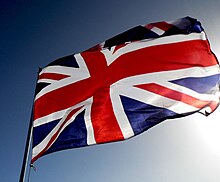User:Poobarb/Sandbox
Terminology
[edit]
Whether to use "Union Flag" or "Union Jack" is a matter of debate.
When the first flag was introduced in 1606, it became known simply as "the British flag" or "the flag of Britain". The royal proclamation gave no distinctive name to the new flag. Nevertheless, the term "Union Flag" is used in King Charles's proclamation of 1634,[1] and in King George III's proclamation of 1 January 1801 concerning the arms and flag of the United Kingdom of Great Britain and Ireland.[2] Amongst the proclamations issued by King George III at the time of the union of 1801 was a proclamation concerning flags at sea, and which referred to "Our Flags, Jacks, and Pendants" and forbade merchant vessels from wearing "Our Jack, commonly called the Union Jack" nor any pendants or colours used by the King's ships.[3] In contrast, the King's proclamation of the same day concerning the arms and flag of the United Kingdom, not colours at sea, called the new flag "the Union Flag".
The word "jack" was in use before 1600 to describe the maritime bow flag[4]. By 1627 a small Union Jack was commonly flown in this position. One theory goes that for some years it would have been called just "the Jack", or "Jack flag", or "the King's Jack", but by 1674, while formally referred to as "His Majesty's Jack", it was commonly called the Union Jack, and this was officially acknowledged.[5]
The Flag Institute, the vexillological organisation for the United Kingdom, stated that the term Union Flag is a "relatively recent idea". Jack was a word previously used to denote any flag.[6] It also noted that "From early in its life the Admiralty itself frequently referred to the flag as the Union Jack, whatever its use, and in 1902 an Admiralty Circular announced that Their Lordships had decided that either name could be used officially. Such use was given Parliamentary approval in 1908 when it was stated that "the Union Jack should be regarded as the National flag"[5]. One theory is that the "Jack" part of the name may also have come from the name of King James I/James VI of Scotland.[7]
The size and power of the Royal Navy internationally at the time could also explain why the flag was named the "Union Jack"; considering the navy was so widely utilised and renowned by the United Kingdom and colonies, it is possible that the term "Jack" occurred because of its regular use on all British ships using the "Jack Staff" (a flag pole attached to the bow of a ship). Even if the term "Union Jack" does derive from the jack flag, after three centuries, it is now sanctioned by use, has appeared in official use, and remains the popular term.[8] Members of the Royal Navy only refer to the flag as the Union Jack when it is flying on their ships, commonly phrased as 'at sea'. Even the same flag, before it is flying will be called the Union Flag.[citation needed]
The term "Union Flag" is less well-known outside the United Kingdom[9][10]. Depending on context it may also refer to other union flags, such as the flags of intergovernmental organization including the flag of the EU, the Flag of the African Union etc.; or in certain contexts the versions of the flag of the United States in use by the Union during the American Civil War; or to the flag of other historic entities such as the Soviet Union or Kalmar Union.
- ^ "Proclamation appointing the Flag, as well for Our Navy Royal as for the Ships of Our Subjects of South and North Britain" (1634) - … none of Our Subjects, of any of Our Nations and Kingdoms shall from henceforth presume to carry the Union Flag in the Main top, or other part of any of their Ships (that is) St Georges cross and St Andrews Cross joined together upon pain of Our high displeasure, but that the same Union Flag be still reserved as an ornament proper for Our own Ships and Ships in Our immediate Service and Pay, and none other."
- ^ "A Proclamation Declaring His Majesty's Pleasure concerning the Royal Style and Titles appertaining to the Imperial Crown of the United Kingdom of Great Britain and Ireland, and its Dependencies, and also the Ensigns, Armorial Flags, and Banners thereof" (1 January 2009) London Gazette, 30 December 1800
- ^ "A Proclamation Declaring what Ensign or Colours shall be borne at Sea, in Merchant Ships or Vessels, belonging to any of His Majesty's Subjects of the United Kingdom London Gazette 17 January 1801
- ^ The flag institue: The Union Jack or The Union Flag?[1]
- ^ a b Cite error: The named reference
flaginstwas invoked but never defined (see the help page). - ^ The International Flag Book, Pederson cf, Blandford Press London
- ^ The International Flag Book, Pederson FP, 1971 Blandford Press London
- ^ United Kingdom at Flags of the World. Retrieved on 2008-06-10.
- ^ Cite error: The named reference
rufwas invoked but never defined (see the help page). - ^ The Union Jack in the Australian National Flag
